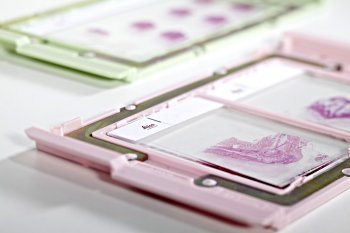The largest capture area of any line scanner in digital pathology is now possible with the Leica SCN400 and SCN400 F. The latest release in Leica’s Total Digital Pathology portfolio enables the digitization of very large specimens, not possible with any other line scanning digital pathology system.
This development provides a new level of flexibility in digital pathology, enabling users to scan a wide range of samples on a single system. Traditional (26 x 76 mm), double (52 x 76 mm) and now extra-large Jumbo (113 x 76 mm) slides can all be captured in either brightfield or fluorescence using the Leica SCN400 and SCN400 F scanners.

Existing users of the Leica SCN400 digital slide scanner range can benefit from being able to implement large slide scanning, without any hardware changes or physical updates to their scanners.
To view some sample large slide scans, please visit our Virtual Slide Gallery at www.leica-microsystems.com/products/digital-pathology.
Dr. Donal O’Shea, Head of Digital Pathology in Leica Microsystems says, “Line scanning in digital pathology has, until now, been limited to single and double slides. The introduction of extra-large slide scanning is a significant advancement for neuroscience, toxicological pathology and anyone dealing with large tissue sections. The cost and time saving benefits of sharing large tissue sections digitally rather than physically is a valuable tool for our users.”
Leica Microsystems’ Total Digital Pathology portfolio scanning range enables the capture of the widest range of sample types whether brightfield, fluorescence or FISH demonstrating Leica’s drive and innovation in this market. Leica Microsystems’ broad range of interoperable Digital Pathology components provides customers with the flexibility to choose the solution that is right for their needs.
Experience Leica Microsystems’ Total Digital Pathology solutions at booth 2825 during the Society for Neuroscience annual meeting, from November 12-16 in Washington, DC.